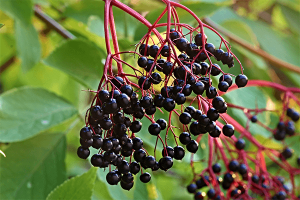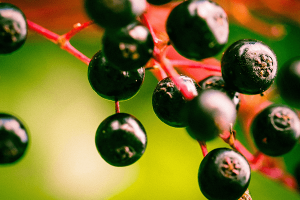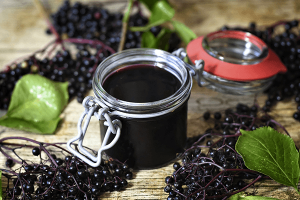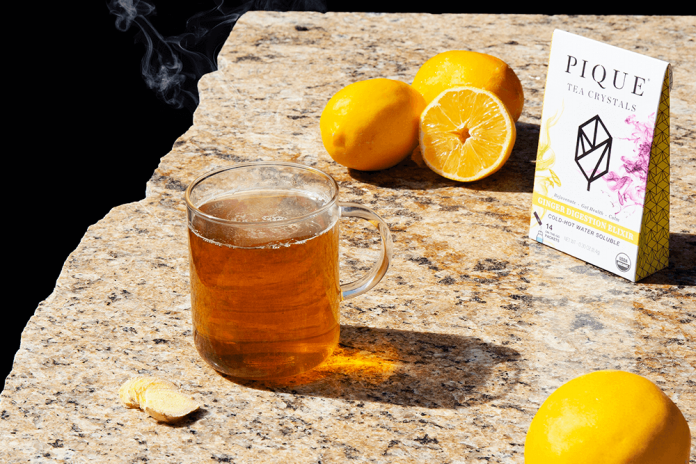When looking for natural remedies to improve your health and wellness, you may have come across elderberry, a type of berry that’s been used in folk medicine for centuries, and primarily for immune support.
Modern research on elderberries suggests they may be a powerful addition to your defenses during sniffle season.
Below, we’re digging into information about what elderberries are, who should avoid them, what the research shows about the health benefits of elderberry, and the possible side effects of using it.
Let’s begin with the basics:
What is Elderberry?
Elderberry is a type of berry that comes from the black elder tree (scientifically known as Sambucus nigra or, more commonly, European elder). American elder and European black elderberry varieties grow in temperate to warm climates and stretch as far as Asia and Northern Africa [1].
The raw berries resemble a blueberry in appearance but boast a much deeper purple color. You may already know the white flowers on the elderberry plant are called elderflower.
The use of elderberry dates back to traditional folk medicine. According to ancient medical traditions, elderberry benefits include help for cold symptoms, some seasonal allergies (such as hay fever), and other instances of nasal congestion [1]. Some cultures also use it to support the body against sinus infections [2].
One reason for these claims may lie in elderberry’s nutritional makeup. The berries are high in vitamin C (up to 55% of your daily value), which helps to naturally support your immune system health [3].
Plus, the deep, dark color of elderberries means they’re bursting with flavonoids and antioxidants. Fruits and veggies with high levels of antioxidants may help your body fight off free radicals, thus supporting natural anti-inflammatory pathways in your body [4].

What are the Health Benefits of Elderberry?
What is elderberry good for? While research on elderberry benefits may be limited, studies and research show the following benefits:
Elderberry Is Dense in Micronutrients
As a healthy plant food or supplement, elderberries help nourish your body with the nutrients you require to be healthy.
They have respectable amounts of vitamins, minerals, and fiber, containing up to[5][6]:
-
- 38 milligrams of calcium (4% of the recommended daily allowance or RDA)
- 1.6 milligrams of iron (9% of the RDA)
- 5 milligrams of magnesium (1% of the RDA)
- 39 milligrams of phosphorus (6% of the RDA)
- 280 milligrams of potassium (8% of the RDA)
- 0.11 milligrams of zinc (1% of the RDA)
- 61 micrograms of copper (7% of the RDA)
- 36 milligrams of vitamin C (55% of the RDA)
- 0.5 milligrams of niacin (3% of the RDA)
- 230 micrograms of vitamin B-6 (18% of the RDA)
- 6 mcg of folate (2% of the RDA)
- 600 iu of vitamin A (20% of the RDA)
- 15 mg of vitamin E as alpha-, beta-, delta-, and gamma-tocopherols and alpha-tocotrienol) (100% of the RDA)
The amounts above correspond to 100 grams of whole elderberries, and would differ somewhat for other forms (such as elderberry syrup, juice, lozenges, or dried berries).
Either way, though, there’s no doubt that elderberries are a healthy, abundant whole food source of essential nutrients.
Elderberry Contains Powerful Antioxidants
As impressive as the micronutrient content of elderberries may be, the phytonutrients (beneficial plant chemicals) and antioxidants contained within could be even more valuable for your health.
Normally, your metabolism and the foods you eat create byproducts known as free radicals that have the potential to damage cells and tissues in your body in a process known as oxidative stress [7].
Your body maintains a delicate state of balance that mostly prevents harm from free radicals, but as you age, or if you become ill, it’s more likely that cumulative damage will occur [7].
Many scientists now think that oxidative stress is a factor in the effects of aging and illness [7].
And there’s where natural antioxidant foods and supplements could play a beneficial role in ensuring you stay healthy.
By helping to support anti-inflammatory pathways and protect cells from free radical damage, elderberries and other antioxidant-rich plants (such as Camellia sinensis) have real potential to support your health and wellness [8].
Scientific researchers are just beginning to understand and categorize the many antioxidants in elderberries. So far, here’s what’s been established[6] :
- Most of the antioxidants in elderberries are polyphenols (such as flavonols, phenolic acids, proanthocyanidins, and anthocyanins).
- Colorful anthocyanins such as cyanidin-3-glucoside, cyanidin-3-sambubioside, and others are responsible for the striking purple-black color of elderberries.
- Elderberry is a good source of flavonols and phenolic acids, including quercetin, kaempferol, isorhamnetin, chlorogenic acid, and small amounts of ellagic acid.
Of course, simply naming or identifying plant compounds doesn’t necessarily mean modern science has a deep grasp of how they work yet.
In that regard, it’s possible that the traditional cultures who use elderberries medicinally could still possess a better functional understanding than modern researchers.
Next, you’ll learn how the micronutrients and plant antioxidants in elderberry may support immune health and more, according to current evidence.
Elderberry May Support Immune Health
Along with supporting cellular health, studies suggest that antioxidants and phytochemicals in elderberries also have the potential to support healthy immune function.
Of the individual constituents in elderberry, quercetin appears to be the best-studied antioxidant for immune support at this time [9].
However, numerous studies have investigated the effects of elderberry or elderberry extracts on seasonal sniffles and a variety of other complaints [10][11][12][13].
While promising, this research is preliminary. Larger and more thorough studies are necessary for drawing conclusions on this topic.
If the effectiveness pans out in future research, some scientists hope that elderberry could help cut down on the misuse of antibiotics and other medications with undesirable side effects [10].
Elderberry May Support Cardiovascular and Metabolic Health
There’s strong scientific evidence that a diet rich in flavonoids like those in elderberries helps support heart health and a healthy cardiovascular system [14].
One human study reported that taking an infusion made from ripe elderberries for 30 days helped support healthy levels of cholesterol and triglycerides [15].
Some animal evidence also suggests that elderberry could help support healthy blood pressure, healthy cholesterol levels, and cellular health within the cardiovascular system [16].
Lastly, elderberry may help support healthy blood sugar levels and a healthy metabolism, which in turn also contribute to better cardiovascular health [17][18] .

Does Elderberry Actually Work?
Currently, there’s limited but favorable evidence supporting the benefits of elderberry and elderberry supplements.
As is the case with many foods and dietary supplements, smaller studies have generated promising results, but larger clinical trials would be necessary to draw better conclusions.
That said, it’s clear that elderberry is an excellent source of vitamins, minerals, and healthy phytonutrients, and that incorporating elderberry as part of a well-rounded, healthy diet can help support your health and wellness.
How Do You Take Elderberry?
Elderberry fruits should not be eaten as is, especially unripe or raw berries, because they are toxic. Raw elderberries must be cooked before they’re consumed.
Because of that, most people reap the health benefits by taking elderberry supplements, drinking elderberry juice, or eating elderberry lozenges and gummies. You can also make homemade elderberry extract and elderberry syrup from cooked or dried elderberries.

Should You Take Elderberry Everyday?
The Food and Drug Administration (FDA) does not regulate the safety of oral elderberry extract, syrup, or other elderberry dietary supplements. So it’s best to proceed with caution and speak with your healthcare provider before adding elderberry to your health and wellness plan.
If you’re going to take elderberry every day for immune support, it’s best to choose supplements from reputable sources using organic, high-quality ingredients and zero chemical additives, preservatives, or artificial dyes.
Who Should Not Take Elderberry?
Pregnant women should not take elderberry without first consulting with their doctors. This is because there currently exists insufficient research to know whether elderberry is safe for women who are pregnant. It is also recommended that people with rheumatoid arthritis, lupus, or other autoimmune diseases should speak with their doctor before taking products containing elderberries.
The Penn State research team says [19]:
- Those taking diuretics, such as Hydrochlorothiazide, Bumetanide, Furosemide, and Amiloride, should ask their health provider before taking elderberry because it acts as a diuretic.
- Elderberry may affect blood sugar levels, which is important to note if you’re already taking diabetes medications to lower your blood glucose levels.
- Patients on chemotherapy should also ask their doctors before taking elderberry since it may interact with certain drugs.
- Anyone taking laxatives for constipation should discontinue them while taking elderberries since supplements could increase the effects of laxatives.
- People taking theophylline for asthma should also consult their doctor beforehand.
- Those on immune suppression drugs should ask their doctor if elderberry consumption is safe as well.
What Are the Side Effects of Elderberry?
What are the side effects of elderberry dietary supplements? Elderberry may have diuretic and laxative effects in some people at high doses. It may also interact with certain drugs, as mentioned in the previous section.
Other than those, research demonstrates very few side effects of elderberry supplementation. But keep in mind that participants in these studies only took elderberry for less than five days [19].
Final Thoughts on Elderberry
While early studies on the health benefits of elderberry are promising, we’d still like to see additional studies verifying these findings on a large scale.
Until then, it may not be a bad idea to use elderberry as a complementary option to a healthy lifestyle to fortify your immune system. Elderberry side effects are limited, and you can find supplements in various forms.
It’s always best to consult your healthcare provider before taking any supplement, including natural remedies like elderberry.
Over to you now: Do you currently take elderberry supplements, or do you plan to in the future? Let us know in the comments below!






